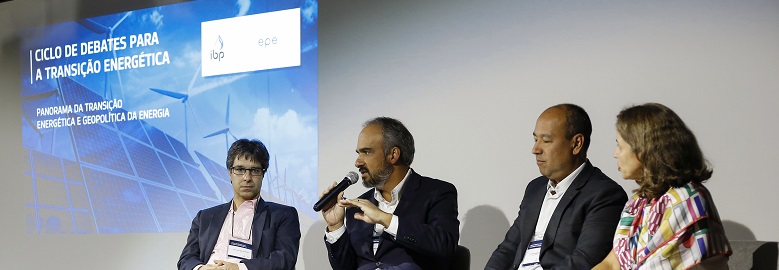IBP brought together specialists to discuss energy transition

Sector agents emphasizes the Brazilian competitiveness aspects in renewables at an event in partnership with EPE
The Brazilian Petroleum, Gas and Biofuels Institute (IBP), in partnership with Energy Research Office (EPE), organized the first edition of Cycle of Debates for the Energy Transition, on April 25. Focusing on the transition to a low carbon economy, the event brought together experts to discuss two of today’s major global challenges: the energy transition landscape and the energy geopolitics. To José Firmo, IBP president, this type of discussions creates opportunities to the sector.
“At the same way Brazil decides strategically to open the E&P market, that brought significant results, we need, as a country, to debate the inclusion of natural gas in the energy matrix. Brazil did not found an efficient model to use gas as fuel”, affirmed Firmo. “We have an opportunity to use associated gas to be produced in the next five years, for example, to the reindustrialization of Brazil”, added.
The continued growth of oil production in Brazil reinforces this opportunity. According to EPE Director of Petroleum, Gas and Biofuels Studies, José Mauro Coelho, the Brazilian oil production will double in the next few years, reaching 5 million barrels per day in 2030. “Brazil is expected to export about 3 million barrels of oil per day by the end of the decade. But on the other hand, we also have a competitive advantage in biofuels. Ethanol production is expected to grow, reaching 49 billion liters per year in 2030, compared to the current 34 billion liters. Just as biodiesel production will increase, from 5.4 billion liters to 11 billion liters”, explained Coelho.
Even the energy transition happens slowly over the years, Brazil has the advantage of possessing a renewable energy matrix. According to Luiz Augusto Barroso, PSR Consulting president, the pillars of renewability of the national matrix – hydroelectric, wind and solar – complement each other and constitutes a differentiated portfolio comparing to the rest of the world. “The core of our energy matrix is the goal many countries dream of achieving in years. The big challenge at this moment, is to find business, financing and regulatory models for the energy transition”, said Barroso.
Alexandre Szklo, COPPE/UFRJ energy planning program associated-teacher, believes that Brazil has great competitiveness advantages comparing to other markets, but the country’s role in the world energy transition is relate to the need of have state policies for the sector rather than government policies. “We have a great potential energy matrix. We just need to draft the path to where we need it and we want to go”, added Szklo.
Market initiatives
The oil and gas companies have been preparing for the energy transition, investing in sources other than oil and positioning themselves as energy companies. To Flávio Rodrigues, Shell Director of Government Relations and Regulatory Affairs, the operator annual investment is about US$ 25 billion, with US$ 2 billion reserved for new energies.
For the executive, the main need competence for oil and gas companies to become more complete is the understanding of the local reality. “From the training of personnel to a greater understanding of issues such as regulation and local market, it is possible to make more assertive decisions”, affirmed Rodrigues.
The Cycle of Debates for the Energy Transition next edition, in June, will address climate change. In total, there will be five meetings throughout the year focused on the challenges of energy transition.